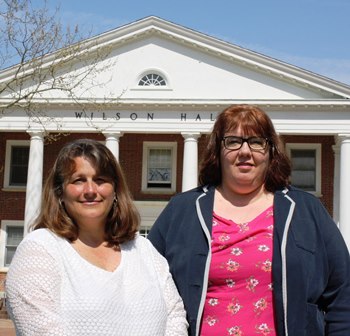
Open educational resources coming to UMES
Thursday, April 13, 2017
UMES students who register this fall for a select number of general education classes offered by the university’s Department of English and Modern Languages can expect to spend less on traditional textbooks.
That’s the objective of Courtney Harned and Bonni Miller, who are tapping into an emerging grassroots movement known as “open educational resources” to revamp outlines for a half-dozen courses.
Miller and Harned conservatively project a successful transition could collectively save hundreds of UMES students upwards of $150,000.
“Textbooks are a significant expense for our students,” Harned said. “I see it in my classroom all the time.”
Harned and Miller each received a $2,500 grant from the William E. Kirwan Center for Academic Innovation to underwrite a project to identify and compile online sources that their UMES faculty colleagues can then use crafting lesson plans.
“These are all materials that have been vetted,” Harned said.
“The level of transparency,” Miller noted, “creates confidence in the quality of the material.”
Use of open education resources will give UMES instructors the flexibility to customize a syllabus for a pre-requisite course with multiple sections. One professor might like using fiction while a colleague may prefer teaching current events using news-gathering sites and periodicals. UMES students in those courses will nonetheless be expected to meet basic objectives and outcomes established by the state of Maryland.
Miller informally has been using material she found online in classes she teaches in fiction and drama.
She found motivation to do so three years ago after attending a conference where she heard Jack Andraka describe how, as a high school student, he did Internet research to devise a simple blood test for cancer detection.
“I was inspired by him” Miller said. “If he could do what he did, I can certainly teach a grammar class using the best resources I can find” online.
“I can’t in good conscience ask students to pay $85 for a textbook, when I can provide them what they need with a little online research,” Miller said.
Miller and Harned are among 21 educators at colleges across the state chosen by the Kirwan Center to receive a “high-impact mini-grant” through the Maryland Open Source Textbook initiative.
“The replacement of traditional textbooks with open education resources has the potential to make higher education in the state of Maryland more affordable and accessible for students,” Kirwan Center director M.J. Bishop said.
“Our goal,” Bishop said, “is to strategically scale up effective implementation of (these resources) across the state and significantly increase the number of students who are impacted through textbook cost savings.”
UMES students taking traditional first-year English classes, technical writing and advanced composition will still have to show up. They’ll just use electronic devices to access reading material and supplemental information need to completed assignments and study for exams.
“They’re much more comfortable doing this kind of work online,” Harned said.
Colleagues from other UMES academic units already have attended a campus workshop conducted by Lumen Learning, an Oregon-based company specializing in helping educators reduce reliance on textbooks. Harned said there are high expectations the experiment in UMES’ English department will inspire others to embrace the teaching strategy.
When the Kirwan Center advertised for grant applications, it set a goal of limiting student textbook costs to about $40 per class. Harned and Miller believe UMES students may spend less than half that much on “hard copy” reading material – if anything at all.
In addition to the Kirwan Center mini-grants, Harned and Miller also will get help from Lumen Learning, including training, personalized support for adoption, delivery and access to a collection of curated courses as well as (an online) platform to build, edit and deliver courses.
Harned credits colleague Robin Hoffman in UMES’ Center for Instructional Technology for helping her and Miller move the content/text materials they identified from Lumen’s online platform to the university’s Blackboard system, which will make it accessible to students. Hoffman encouraged Miller and Harned to seek the grant from the Kirwan Center.
Both said they are finding the 20th century model of college textbook publishing is becoming increasingly outdated. Maturation of the Internet as a reliable source of shared instructional material has made instantaneous publishing commonplace.
“Open education resources is more in the spirit of education,” Miller said.
“Education,” Harned added, “is not about making money.”
“When you publish the latest developments or changes or discoveries online, isn’t that what we want our students to have?” Harned said.

